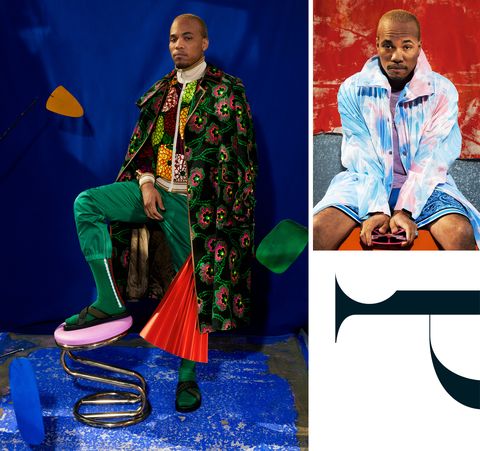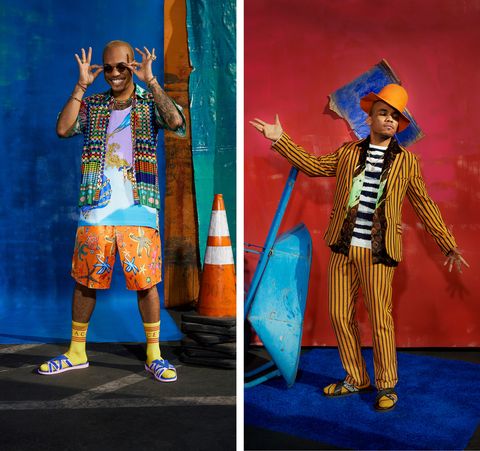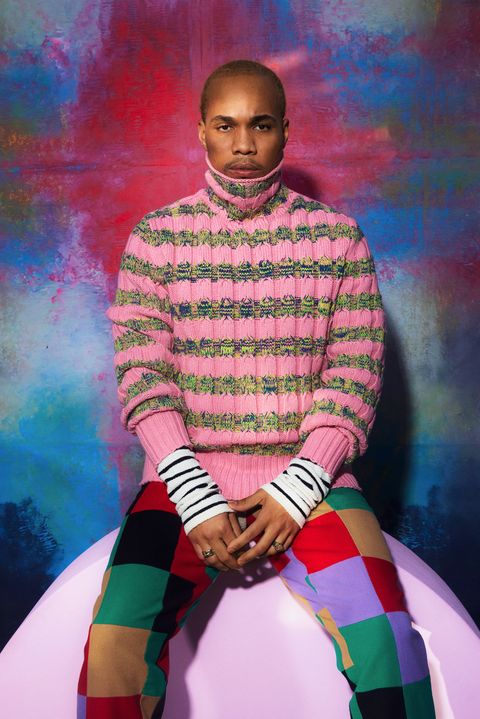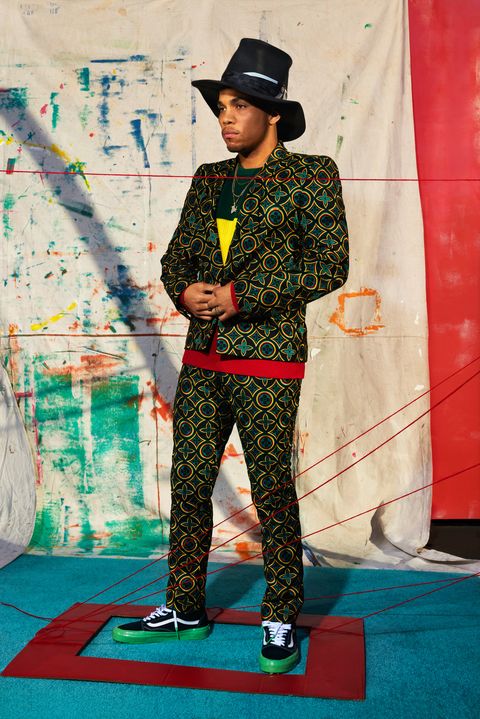Anderson .Paak is juggling his parenting and professional duties. It’s a sunny afternoon in early December, and the polymath musician is bouncing around the backyard of the modest house he shares with his wife, Jaylyn, on the southern rim of California’s San Fernando Valley. He’s trying to talk about his new album, which he was working on in his studio until eight in the morning. But he keeps bringing it back to his and Jaylyn’s sons—Soul, nine, and Shine, three—who presently are running around on the safe side of the pool gate.
Soul is obsessed with the K-pop band (and recent Esquire cover stars) BTS. “I tell him, ‘Yeah, K-pop is where it’s at, man. Make sure you keep up with your Korean’ ”—Jaylyn, a singer in a gospel rock group, is from South Korea; theirs is a bilingual home—“ ‘because you could be rapping in Korean one day, and we’ll fly your ass out there, and you won’t got to worry about shit.’ ” For his part, Paak wouldn’t say no to a BTS collab. “I’m working on trying to get that plug, man,” he says, mostly joking. “If you know of any way, let me know, bro.” The idea isn’t that crazy. Rather, it wouldn’t have been crazy before the pandemic. 2019 was the biggest year of Paak’s career: He released his first top-ten album, Ventura; went on a massive world tour that included a sold-out show at Madison Square Garden; and picked up a couple of Grammy Awards. “Then, fast-forward, and it’s COVID,” he says, puttering near the swing set that for now has caught the kids’ attention, “and I have no choice but to just stay in the house.”
Paak, thirty-five, mainly spent last year working with a budding artist much closer to home. Since the pandemic began, he and Soul have collab’d on several projects—from Instagram dance memes to actual music videos. Toward the end of our conversation, he shows me the dance studio he built for Soul, featuring floor-to-ceiling mirrors and a disco ball.
“Some things he probably thinks they’re just normal,” Paak says of Soul. “He probably just thinks like meeting up with Dr. Dre is normal. Having dinner with Bruno Mars is normal. And having BTS shout you out, that’s just because he’s the coolest guy.”
Paak’s own childhood was much different. He grew up in Oxnard, along the coast north of L. A. His father, an addict who was abusive to his wife, went to prison when Paak was just seven; father and son never spoke again. When Paak was a senior in high school, his mother, who’d opened and shuttered a strawberry business before gambling professionally, also went to prison, for securities fraud. “I’ve been through a lot of crazy shit. Coming up, I was just used to a lot of tragedy,” he tells me. “But I was also used to a lot of optimism and hope and family.”
Paak’s music is a lot of things: a blend of funk, soul, hip-hop, and R&B, often with thought- provoking lyrics. Above all else, it sounds optimistic. Watching him perform live—seated at a drum set, grinning manically, spitting verses and singing choruses, keeping the beat all the while for his live band, the Free Nationals—is a form of music therapy. Who knows when that’ll once again be possible?
“That’s probably where the biggest void is at,” Paak says. “For years, you’re on stages, and it becomes like you need the rush of the admiration; you need to hear people cheering your name, to know that you still got it. Now the show’s no more, and you’re like, ‘Damn, we ain’t got it.’ As an artist, there’s a part of me that’s struggling, because you need that mojo.”
In June, just three weeks after George Floyd’s murder, Paak released “Lockdown,” a protest song with an uplifting groove that pays tribute to those who marched last summer for racial justice. “An offering,” as Paak describes it. “Just like Marvin Gaye made an offering with ‘What’s Going On.’ ” The single was nominated for two Grammys, and it presaged the songs Paak has been burning the 8:00 a.m. oil on for his fifth, as-yet-untitled LP. “With this new material,” he says, “you’re going to get some real topics, and you’re going to get some substance, but mixed with some great grooves.”
As with his last two albums, Dr. Dre, his mentor, is involved. “Dre’s having a good-ass time,” Paak says of quarantine life for the acclaimed producer. “That’s already his life—isolation, working all the time. I think he was probably used to it. But he’s having fun now because a lot of people have more time on their hands, so they can come visit him and make music with big Uncle Dre.” (In early January, Dre, fifty-five, had a brain aneurysm; he announced on Instagram that he was “doing great and getting excellent care from my medical team. I will be out of the hospital and back home soon.” And by late February he was back in the studio rapping about the incident.)
Paak says Dre has been “letting me fly and figure it out” this year. But, of course, Dre will always let Paak know if he’s feeling a track or not.
“His ear is his ear, man, he be hearing shit and it’s like if he ain’t feeling it, he’ll let you know right away, man. It hardly ever has to grow on him, he knows right away,” Paak tells me. “I like that about him though, sometimes I’m a little indecisive, so it really helps me. It’s like, ‘Okay, well Dre ain’t feeling this, so maybe this ain’t the one, or I’m going to take a chance on this.'”
The new album will also include a collaboration from fellow critically acclaimed multi-instrumentalist H.E.R. “Those sessions were amazing,” Paak says. “It’s rare you meet real musicians now that are artists that can really produce and handle everything, and she’s one of them. She’s a monster in the studio, and can play that damn guitar and sing her face off.”
He’s also stayed in touch with Kendrick Lamar, who he worked with on “Tints” off 2018’s Oxnard. “We talk just through texts and just off and on,” Paak tells me. “I always check on him and the family and make sure he’s good. He’s always responsive, and just like, just let me know he’s hanging in there just like everybody else.”
Meanwhile, Paak is working with his longtime friend, the producer Knxwledge, on the long-awaited second entry from their side project, NxWorries (which Paak says is some of the best material he’s been making).
Paak has also spent the past few months working on a number of high-profile pop collaborations: He plays drums on “Teach Me How to Love,” the fifth song on the fourth studio album by the saccharine Canadian swooner Shawn Mendes. Paak describes their meet-cute. It was the summer of 2019. Mendes “came to our Toronto show,” he says. “My dumb ass, I didn’t even know who it was at first. I’d heard his name and shit, but I was like, ‘I’m not sure; I think he’s an actor or something.’ I looked him up. I was like, ‘Oh yeah, this kid, he’s huge.’ I met him after the show, and he was just the coolest kid. Just so polite, man.”
And on March 5, Paak and Bruno Mars shared their first collaborative song as Silk Sonic. The track, “Leave the Door Open” is a natural meeting of styles—a vintage, satiny soul slow jam.
“I’m so blessed that I never had to be nobody but me, and I can maneuver freely,” he tells me. “That’s the thing that keeps me the most happy is being able to go into different rooms, whether it’s with the gangsters or the rockers or the hipsters or the intellectuals. It’s like, everybody knows Anderson .Paak, I just wanted the respect in all those rooms.”
Mainstream crossovers and dance memes are great and all, but Paak just wants to be back onstage. “I want it, man, I’m ready for the lights,” he says. He sits on the ground in the corner of Soul’s dance room—a bit of respite after a long night of recording and a day of fathering. “Especially being cooped up, it’s like, ‘Now I want this shit to do damage.’ ”
Photographs By Djeneba Aduayom, styling By Alison Edmond.









